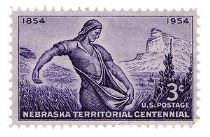Extension, Cooperative

Nebraska Agricultural Experiment Station: Historical Research Bulletins
Date of this Version
9-1990
Document Type
Article
Citation
Penas, E.J., Wiese, R.A., Elmore, R.W., Hergert, G.W., and Moomaw, R.S. (1990) Soybean chlorosis studies on high pH bottomland soils (Research Bulletin No. 312)
Abstract
Soybean varieties are different in tolerance to lime-induced chlorosis. Field trials were conducted to evaluate variety performance on soils where chlorosis in soybeans was a known problem. Thirty-six varieties out of 177 were identified as tolerant to soil conditions that cause chlorosis. Eleven varieties of these 36 were found to have the most consistent yield performance on high pH soils. Tolerant varieties must be planted at adequate densities for best performance. A seeding rate of 13.5 seeds per foot of row, the highest seeding rate employed, did not appear to maximize yield on soils where chlorosis was severe. On some soils, chlorosis is so severe that even tolerant varieties planted at adequate densities will not produce seed. Under conditions where soils cause moderate to severe chlorosis in tolerant varieties, yields were improved by the use of a high pH stable chelate (Fe-EDDHA) with the seed.


Comments
ISSN 1042-2895